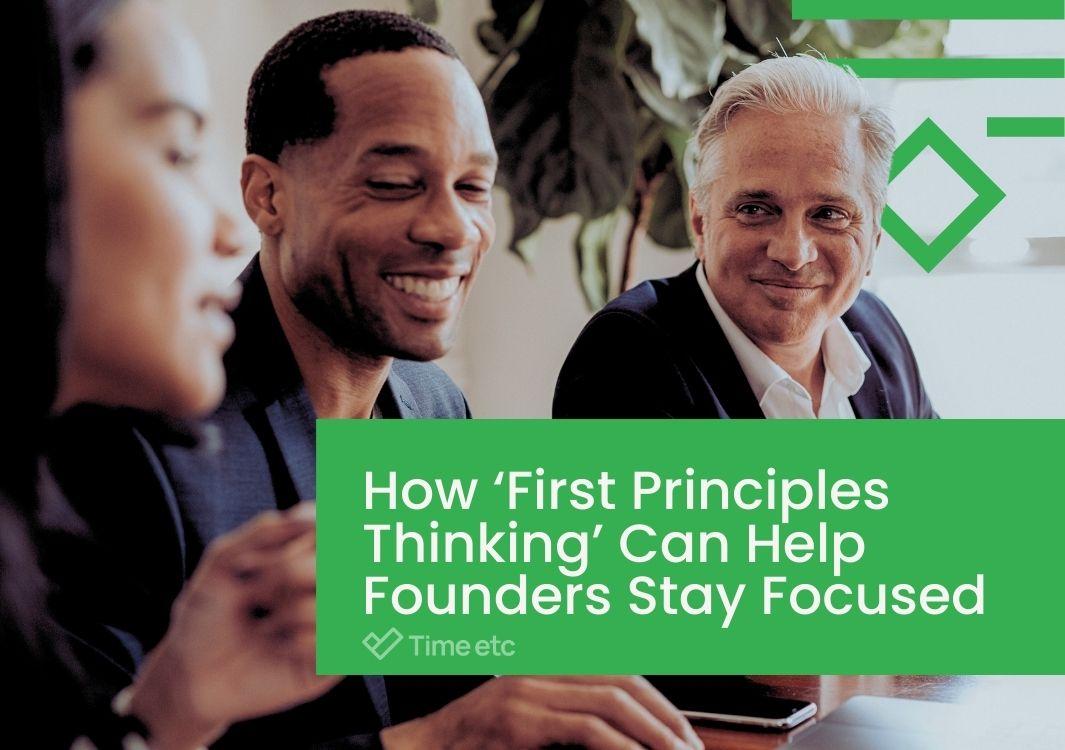Success in business isn't just about having a great product or service—it's about mastering the art of organization.
75% of struggling or failing business owners report that being disorganized has directly impacted their companies' productivity levels, so the ability to streamline operations, manage your workload effectively, and maintain a clear, uncluttered focus can't be overstated.
So, how do the world's most successful business leaders keep it all together?
Here, we'll be covering six powerful organizational methods from icons such as Bill Gates and Elon Musk, each providing a unique insight into handling the complexities of business ownership.
1. “Aggressive” filtering - Bill Gates
As the legendary co-founder and former CEO of Microsoft, Bill Gates’ approach to email organization can teach us all a lesson in digital cleanliness.
With an estimated 5-6 hours per day allotted to reading, responding, and strategizing his emails, Gates has honed his approach to an art form. The key lies in aggressive filtering—only the most critical messages make it through his fortress of inbox rules and search filters.
The practice
Gates’ method is simple yet effective. It begins with establishing inbox rules that automatically divert emails into categories and folders, such as ‘External Communications,’ ‘Internal Conversations,’ and ‘Newsletters.’
By taking control early on, Gates makes sure that his attention isn't sidetracked by unimportant or irrelevant emails, effectively reducing decision fatigue and allowing him to achieve laser-like focus on the tasks at hand.
The takeaway
In an age where email can be a significant source of distraction, adopting Gates’ aggressive filtering can be a game-changer. By reducing the cognitive load of incoming messages, you can create an environment where the work that needs your attention the most isn't constantly overshadowed by the unnecessary.
See: 10 Email Tasks To Outsource To A Virtual Assistant Today
2. Start your day with your most impactful work - Elon Musk
Elon Musk’s mornings are legendary for their intensity and productivity.
The SpaceX and Tesla CEO has been known to tackle his most challenging work first thing, setting the tone for the rest of his day. For Musk, this means dealing with essential emails that he needs to address in order to unblock other people’s work and progress.
The practice
Musk often spends the first hour of his day sifting through emails and addressing any he deems critical. This approach sets the stage for the day's achievements, ensuring that roadblocks are cleared early and allowing for a smoother workflow for the team. Musk makes sure that his contributions are always substantial and strategic by prioritizing impactful work that advances his key projects.
The takeaway
Beginning your day with impactful work makes sure that crucial tasks get done and sets a productive and motivated tone that can carry through your entire day.
Take note of what work truly pushes the needle and requires your undivided attention. Often, these core initiatives can get sidelined as you're caught in the whirlwind of more immediate but less impactful tasks. Schedule these priorities early, before the day can get away from you.

3. Write everything down - Richard Branson
Human memory can be a fragile thing, particularly for small business owners having to keep so many different plates spinning on a daily basis.
No one knows this better than Richard Branson. The Virgin Group founder and serial entrepreneur credits much of his success to the simple habit of writing everything down.
"I have always lived my life by making lists," he explained in a 2017 blog post. "These vary from lists of people to call, lists of ideas, lists of companies to set up, lists of people who can make things happen. I also have lists of topics to blog about, lists of tweets to send, and lists of upcoming plans."
The practice
Branson’s method is about as straightforward as it gets. He always carries a notebook with him to make sure any and all sparks of inspiration can be captured before they disappear, ready to review and refine later on.
But while Branson prefers using the good old-fashioned pen and paper to keep track of his thoughts, you can use your phone, computer, or other digital tools if that's what works best for you. “It doesn’t matter how you record your notes—as long as you do,” he says.
Arguably one of the most important lists he makes each day is a humble to-do list of small, manageable tasks to complete. "By ticking off each task, my ideas take shape and plans move forward."
The takeaway
For any modern business owner, the benefits of writing everything down go beyond just staying organized.
According to experts, our working memory, which is responsible for holding and manipulating information, can only handle around ten items at a time. That's why it's so crucial to keep track of important details so that nothing falls through the cracks.
When we write down our ideas, tasks, and plans, we lighten the load on our minds, allowing us to think more critically and solve problems effectively. This not only boosts productivity but also brings clarity and focus, helping us prioritize and make informed decisions. Written documentation also serves as a dependable reference, minimizing misunderstandings and errors within teams and making sure that operations stay consistent.
There's also another surprising advantage you might not expect.
In a 2018 study, researchers looked into how worrying affects sleep. They found that when we have loose ends or unfinished tasks on our minds, it's harder to get a good night's sleep. But they also discovered that writing down those unfinished tasks on a to-do list for the next day can help calm our minds. This simple practice reduces overthinking and worrying, making it easier to fall asleep faster and for longer.

4. Tackle one challenge each day - Tim Ferriss
One of the biggest stresses of business ownership is being spread so thin that certain tasks get put on the back burner. Whether it's tasks yet to be started or projects left unfinished, the nagging guilt can weigh heavily on your mind.
Even bestselling author and productivity guru Tim Ferriss isn't immune to the pressure of juggling multiple responsibilities and feeling the weight of unfinished tasks hanging over his head. "If I have 10 important things to do in a day, it's 100% certain nothing important will get done that day," he says. "On the other hand, I can usually handle one must-do item and block out my lesser behaviors for two to three hours a day."
The practice
"This is the only way I can create big outcomes despite my never-ending impulse to procrastinate, nap, and otherwise fritter away my days," says Ferriss.
Before you start your day, make a list of three to five things that stress you out the most. These are usually tasks you keep putting off. Ferriss likes using a Post-It note because it keeps things short.
Then, for each item, ask yourself: "If this were the only thing I accomplished today, would I be satisfied with my day?" and "Will moving this forward make all the other to-do's unimportant or easier to knock off later?"
Now, focus only on the tasks where you answered "Yes" to at least one question. Choose one of those tasks and schedule a full two to three hours to complete it during your day. "Cobbling together 10 minutes here and there to add up to 120 minutes does not work," he says.
The takeaway
Like Ferriss, this simple way of prioritizing might just help you break free from habits like procrastination or trying to cram too much into your day. It's a disciplined approach that can transform your daily routine into something truly productive.
When you tackle one challenge at a time, you're making a commitment to yourself to keep moving forward. Instead of spreading yourself too thin by trying to do everything at once, you're making sure the right things get done.
See: From Overwhelmed To Organized: How To Keep On Top Of Your Workload
5. Plan your calendar a year in advance - Bill Gates
For Gates, the key to staying ahead of the game is planning—not just weeks or months in advance but a year or more.
The practice
Don't worry, he doesn't say you need to have every single thing planned out and set firmly in stone. Just having a general idea of your goals, important dates, vacations, and big events can really help you keep things organized and stay focused throughout the year.
It could mean breaking down your big goals into smaller steps, marking important milestones on your calendar, or just getting a feel for how your business flows throughout the year.
The takeaway
Planning ahead as much as you can will help you set a rhythm to your schedule and give you plenty of room to think about how you're doing, as well as what's important. It's your roadmap that keeps you going in the right direction, not just day by day, but for the long term too.
Even though surprises will still pop up, having a good plan to fall back on can make all the difference between a year where you're organized and getting things done, and one where you're feeling all over the place and missing out on valuable opportunities.
See: 3 Ways Your Calendar App Can Make You More Productive Every Day

6. Don’t let self-care slip - Arianna Huffington
As the co-founder of The Huffington Post and the founder and CEO of Thrive Global, Arianna Huffington is no stranger to burnout and the damage it can cause—not just to our bodies and minds, but our business operations too.
These days, she's an outspoken advocate for well-being and productivity. “When we're running on empty, we're also losing the joy of life," she told interviewers. "Our productivity is reduced, and our health is damaged.”
The practice
Huffington takes care of herself by making sure she gets enough sleep, eats well, and exercises regularly.
She also finds time to unwind by taking breaks from technology, engaging in reflection or meditation, and spending quality time with family and friends.
The takeaway
When we talk about staying organized, taking care of yourself might not be the first thing we think of.
But by making self-care a priority, you're making sure you can stay energized, focused, and efficient enough to keep on top of everything you need to.
So in a world where the constant hustle is glorified, this could be one of the best ways to stay organized and do your best work in the long run.
See: How To Get More Sleep: The CEO's Guide To Reclaiming Your Rest
What's the bottom line?
We all know how hectic life can get, especially when you're running your own small business. But the simple reality is that being able to stay organized and on top of things can often be the difference between success and failure.
Just think about it: the most successful entrepreneurs wouldn't be where they are today without having a solid system in place to keep everything on track.
In a world as unpredictable as business, these timeless strategies will keep you steady, even when things get tough. Make these tips your own by turning them into a personal guide that fits your way of working. Remember, this is not a one-time exercise but a lifelong commitment to purposeful living. These skills will not only enhance your work life but also enrich your personal life, professional relationships, and business strategy.
If you're tired of feeling overwhelmed by the never-ending chaos of tasks and deadlines that never seem to go away, Time etc is here for you.
Since 2007, we've helped over 22,000 business owners feel more organized and in control by matching them with the best virtual assistants for their needs. Let us handle everything for you while you focus on growing your business and achieving the success you deserve.
Speak to our expert team to get started, and we'll match you with a skilled professional based on your unique business needs, so you can start doing more of what matters most.
Still on the fence?
Try us out for free today!










